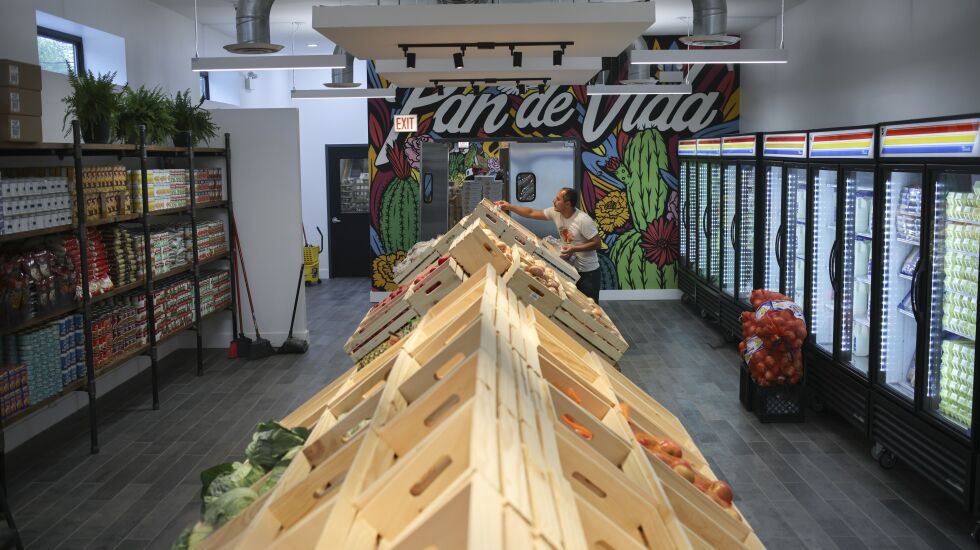
At first glance, Pan de Vida Fresh Market may seem like typical grocery.
There are some local touches, given its location in Little Village. There are Talavera-inspired ceramics. And in the back, a colorful mural features a dove and cacti.
But the produce, tastefully displayed in farmers-market-style crates, isn’t for sale, because Pan de Vida isn’t a grocery store. It’s a food pantry.
Shoppers won’t have to pay a cent, not even for the flowers. Yes, they have flowers.
Pan de Vida has operated out of Little Village for a dozen years. Previously, it was run by volunteers out of the basement of the New Life Community Church.
During the pandemic, the nonprofit New Life Centers became involved, and Pan de Vida went from feeding dozens every week to nearly 10,000, giving away boxes of food, twice a week, drive-thru style, said Matt DeMateo, executive director of New Life Centers.
Pan de Vida’s new, dedicated space, in a two-story building at 2701 S. Lawndale Ave., is scheduled to open Tuesday. The second floor will become an area where social workers can connect clients with resources. There will be computers there, too, for children to learn digital skills.
The pantry will operate five days a week: 8 a.m. to noon on Tuesdays, Thursdays and Fridays; 3 p.m. to 6 p.m. on Wednesdays; and 9 a.m. to noon on Saturdays.
Shoppers — Pan de Vida calls them “clients” — won’t be handed a box of food; they’ll go through and choose what they want.
“It’s going to be like a supermarket,” said Margarita Marquez, a Pan de Vida client who was given a tour. “You’re going to see what it is that you really need. Before, what they had is what you took.”
Pan de Vida’s inside design touches are intentional; the cacti in the mural, for instance, refer to Mexico and to the community’s resilience, DeMateo said.
“We wanted it to be top-shelf,” DeMateo said. “If somebody’s coming in need of a pantry, you think of the basement of a church and some cans, some kind of a space that’s not really full of dignity.”

Little Village was hit hard by COVID-19 and the resulting unemployment. South Lawndale, which includes Little Village, was one of Chicago’s most affected areas, according to the city’s COVID-19 Community Vulnerability Index.
The peak demand of the pandemic has passed, but Pan de Vida still serves thousands every week. Continued COVID-19 fallout is one factor, but others also are at play.
A widow with two children, Marquez cited rising costs.
“Gas is extremely expensive right now,” Marquez said. “The other day I put in almost $100 worth.” Going to Pan de Vida saves her about $100 a week, Marquez said, money that she can spend on rent, bills and clothes for her girls.
Many families that come to Pan de Vida are recent immigrants from Central America, said 10-year volunteer Maria Delgado, who noted how difficult things can be for them.
“There’s people that have three or four people in their family and no one besides the dad working, and working the minimum wage in Chicago,” Delgado said. Without access to federal benefits, they live off of what they earn.
DeMateo said that the pantry will turn no one away, but its priority is the 60623 ZIP code, which encompasses Little Village and parts of Lawndale, and other nearby ZIP codes.
Those coming from farther away still can get what they need, but also are told of a food pantry closer to where they live.

Clients can expect all the basics, including fresh produce (even avocados, sometimes); grass-fed beef and whole chickens; baking supplies; and household items, such as shampoo and detergent.
There will be limits on how much of each item can be taken, but the idea is that shoppers, who are allowed to come once a week, get enough to feed a family of three to five people, said Diana Franco, the administrative coordinator.
Clients must register for a Greater Chicago Food Depository card, which will include the user’s name and address. Franco said Pan de Vida will use the information to understand how many people are served, and ensure they don’t serve the same household twice in a week.
“Many people that are going through a tough time, we always tell them, ‘there’s food here,’” Marquez said.
Michael Loria is a staff reporter at the Chicago Sun-Times via Report for America, a not-for-profit journalism program that aims to bolster the paper’s coverage of communities on the South and West sides.








